Evaluating Economic, Environmental & Socio-Cultural Impacts of Tourism
VerifiedAdded on 2023/06/13
|7
|2129
|365
Essay
AI Summary
This essay provides a comprehensive analysis of the tourism industry, focusing on its economic, environmental, and socio-cultural impacts. It discusses the development of contemporary tourism and significant factors influencing it, such as environmental, economic, technological, cultural, and religious aspects. The essay examines the positive economic impacts of tourism, including improved tax revenue and increased personal income, as well as negative impacts like the import of consumable goods and the decline in traditional employment. Furthermore, it explores the environmental impacts, highlighting both positive aspects like the protection of natural resources and negative aspects such as pollution and depletion of resources. Finally, the essay delves into the socio-cultural impacts, discussing the preservation of local culture and heritage alongside the potential for socio-cultural tensions. The conclusion emphasizes the importance of balancing economic and environmental scales to ensure sustainable development in the tourism industry. Desklib offers a range of resources for students studying tourism and related subjects, including essays, research papers, and study guides.
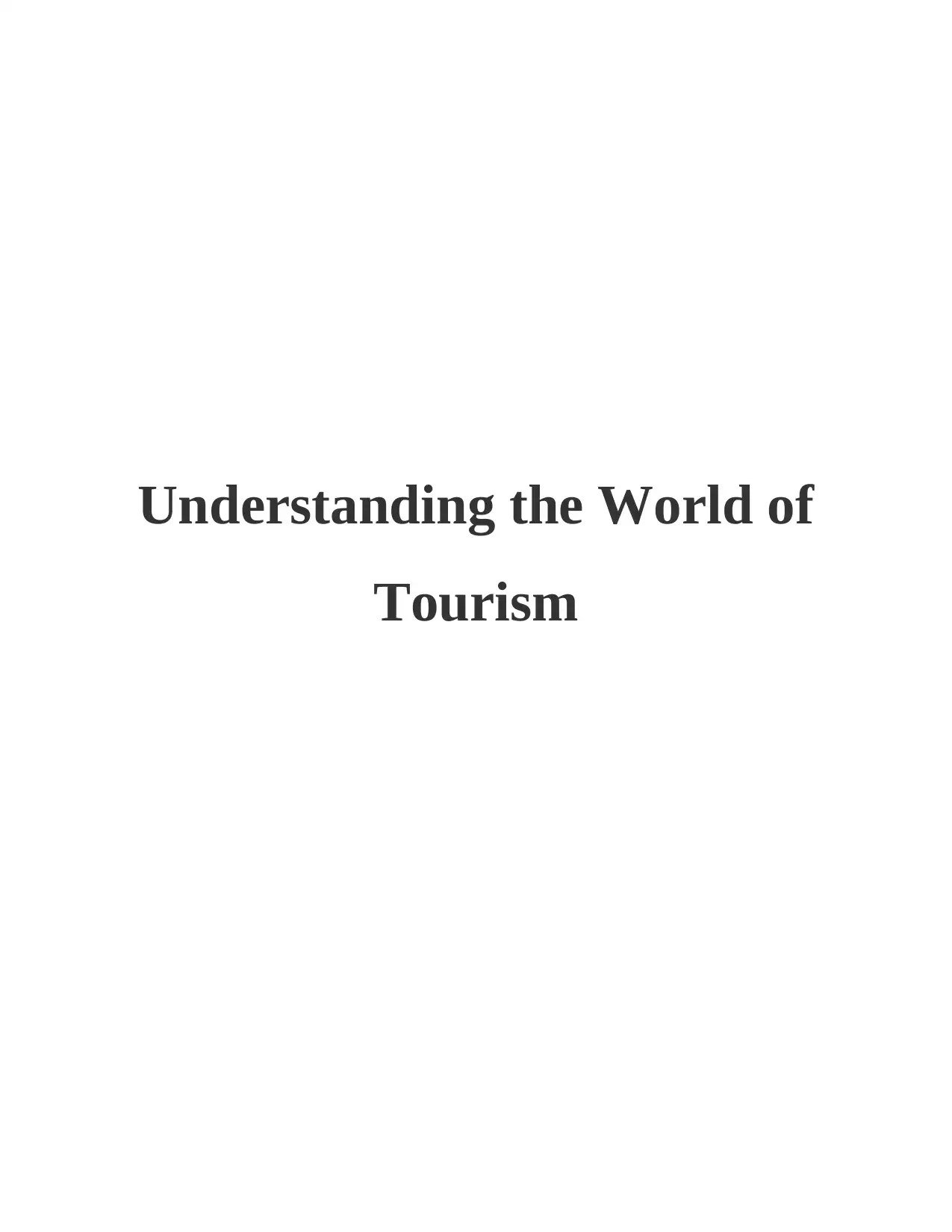
Understanding the World of
Tourism
Tourism
Paraphrase This Document
Need a fresh take? Get an instant paraphrase of this document with our AI Paraphraser
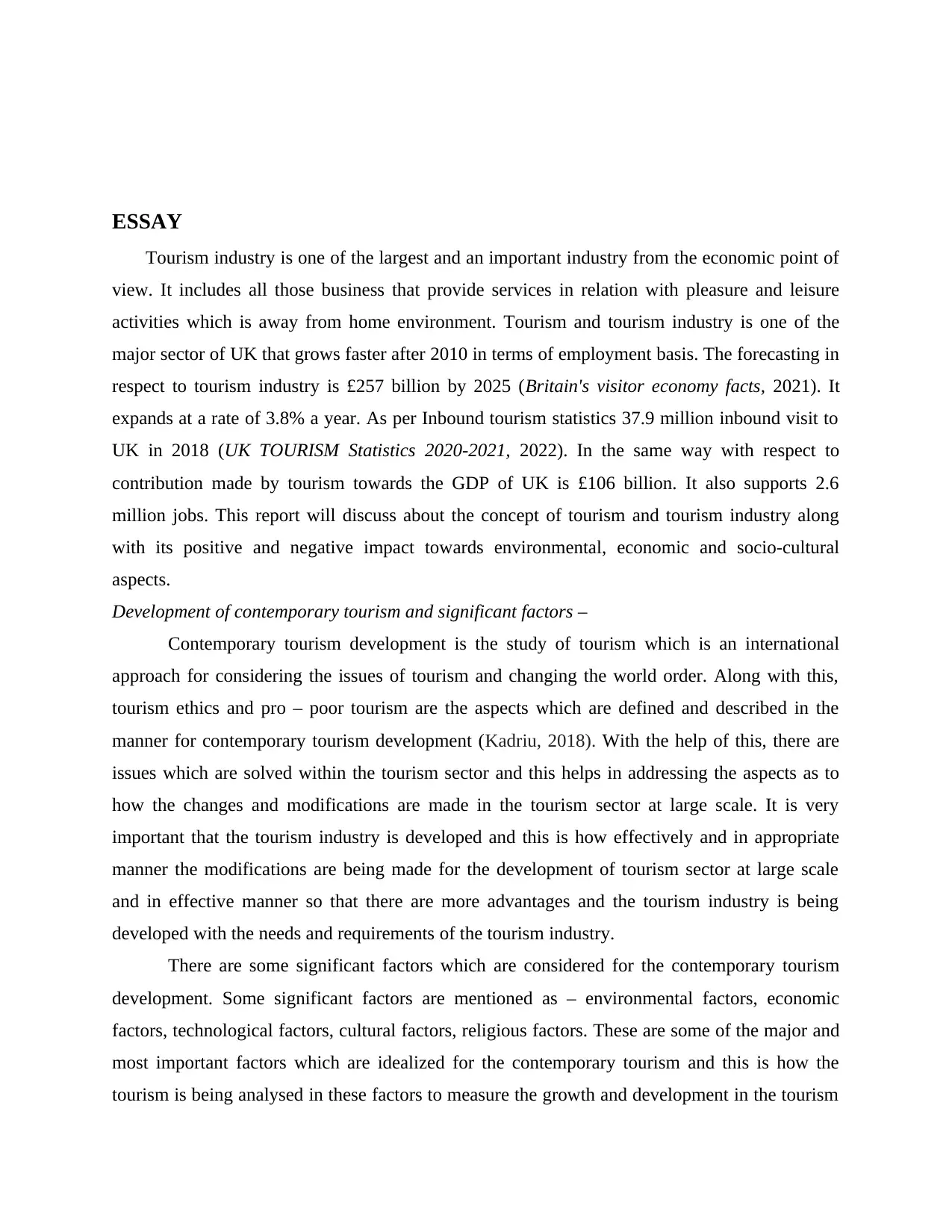
ESSAY
Tourism industry is one of the largest and an important industry from the economic point of
view. It includes all those business that provide services in relation with pleasure and leisure
activities which is away from home environment. Tourism and tourism industry is one of the
major sector of UK that grows faster after 2010 in terms of employment basis. The forecasting in
respect to tourism industry is £257 billion by 2025 (Britain's visitor economy facts, 2021). It
expands at a rate of 3.8% a year. As per Inbound tourism statistics 37.9 million inbound visit to
UK in 2018 (UK TOURISM Statistics 2020-2021, 2022). In the same way with respect to
contribution made by tourism towards the GDP of UK is £106 billion. It also supports 2.6
million jobs. This report will discuss about the concept of tourism and tourism industry along
with its positive and negative impact towards environmental, economic and socio-cultural
aspects.
Development of contemporary tourism and significant factors –
Contemporary tourism development is the study of tourism which is an international
approach for considering the issues of tourism and changing the world order. Along with this,
tourism ethics and pro – poor tourism are the aspects which are defined and described in the
manner for contemporary tourism development (Kadriu, 2018). With the help of this, there are
issues which are solved within the tourism sector and this helps in addressing the aspects as to
how the changes and modifications are made in the tourism sector at large scale. It is very
important that the tourism industry is developed and this is how effectively and in appropriate
manner the modifications are being made for the development of tourism sector at large scale
and in effective manner so that there are more advantages and the tourism industry is being
developed with the needs and requirements of the tourism industry.
There are some significant factors which are considered for the contemporary tourism
development. Some significant factors are mentioned as – environmental factors, economic
factors, technological factors, cultural factors, religious factors. These are some of the major and
most important factors which are idealized for the contemporary tourism and this is how the
tourism is being analysed in these factors to measure the growth and development in the tourism
Tourism industry is one of the largest and an important industry from the economic point of
view. It includes all those business that provide services in relation with pleasure and leisure
activities which is away from home environment. Tourism and tourism industry is one of the
major sector of UK that grows faster after 2010 in terms of employment basis. The forecasting in
respect to tourism industry is £257 billion by 2025 (Britain's visitor economy facts, 2021). It
expands at a rate of 3.8% a year. As per Inbound tourism statistics 37.9 million inbound visit to
UK in 2018 (UK TOURISM Statistics 2020-2021, 2022). In the same way with respect to
contribution made by tourism towards the GDP of UK is £106 billion. It also supports 2.6
million jobs. This report will discuss about the concept of tourism and tourism industry along
with its positive and negative impact towards environmental, economic and socio-cultural
aspects.
Development of contemporary tourism and significant factors –
Contemporary tourism development is the study of tourism which is an international
approach for considering the issues of tourism and changing the world order. Along with this,
tourism ethics and pro – poor tourism are the aspects which are defined and described in the
manner for contemporary tourism development (Kadriu, 2018). With the help of this, there are
issues which are solved within the tourism sector and this helps in addressing the aspects as to
how the changes and modifications are made in the tourism sector at large scale. It is very
important that the tourism industry is developed and this is how effectively and in appropriate
manner the modifications are being made for the development of tourism sector at large scale
and in effective manner so that there are more advantages and the tourism industry is being
developed with the needs and requirements of the tourism industry.
There are some significant factors which are considered for the contemporary tourism
development. Some significant factors are mentioned as – environmental factors, economic
factors, technological factors, cultural factors, religious factors. These are some of the major and
most important factors which are idealized for the contemporary tourism and this is how the
tourism is being analysed in these factors to measure the growth and development in the tourism
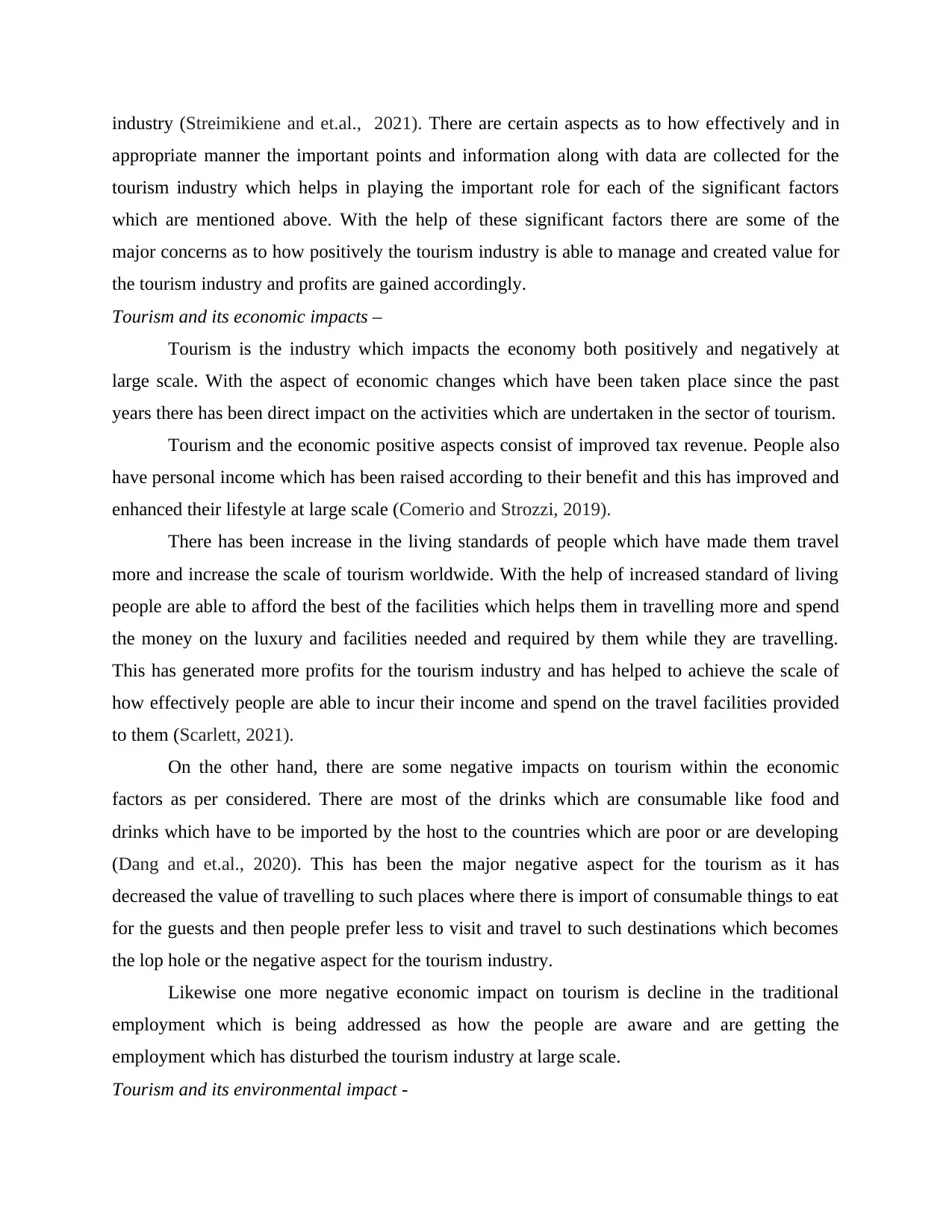
industry (Streimikiene and et.al., 2021). There are certain aspects as to how effectively and in
appropriate manner the important points and information along with data are collected for the
tourism industry which helps in playing the important role for each of the significant factors
which are mentioned above. With the help of these significant factors there are some of the
major concerns as to how positively the tourism industry is able to manage and created value for
the tourism industry and profits are gained accordingly.
Tourism and its economic impacts –
Tourism is the industry which impacts the economy both positively and negatively at
large scale. With the aspect of economic changes which have been taken place since the past
years there has been direct impact on the activities which are undertaken in the sector of tourism.
Tourism and the economic positive aspects consist of improved tax revenue. People also
have personal income which has been raised according to their benefit and this has improved and
enhanced their lifestyle at large scale (Comerio and Strozzi, 2019).
There has been increase in the living standards of people which have made them travel
more and increase the scale of tourism worldwide. With the help of increased standard of living
people are able to afford the best of the facilities which helps them in travelling more and spend
the money on the luxury and facilities needed and required by them while they are travelling.
This has generated more profits for the tourism industry and has helped to achieve the scale of
how effectively people are able to incur their income and spend on the travel facilities provided
to them (Scarlett, 2021).
On the other hand, there are some negative impacts on tourism within the economic
factors as per considered. There are most of the drinks which are consumable like food and
drinks which have to be imported by the host to the countries which are poor or are developing
(Dang and et.al., 2020). This has been the major negative aspect for the tourism as it has
decreased the value of travelling to such places where there is import of consumable things to eat
for the guests and then people prefer less to visit and travel to such destinations which becomes
the lop hole or the negative aspect for the tourism industry.
Likewise one more negative economic impact on tourism is decline in the traditional
employment which is being addressed as how the people are aware and are getting the
employment which has disturbed the tourism industry at large scale.
Tourism and its environmental impact -
appropriate manner the important points and information along with data are collected for the
tourism industry which helps in playing the important role for each of the significant factors
which are mentioned above. With the help of these significant factors there are some of the
major concerns as to how positively the tourism industry is able to manage and created value for
the tourism industry and profits are gained accordingly.
Tourism and its economic impacts –
Tourism is the industry which impacts the economy both positively and negatively at
large scale. With the aspect of economic changes which have been taken place since the past
years there has been direct impact on the activities which are undertaken in the sector of tourism.
Tourism and the economic positive aspects consist of improved tax revenue. People also
have personal income which has been raised according to their benefit and this has improved and
enhanced their lifestyle at large scale (Comerio and Strozzi, 2019).
There has been increase in the living standards of people which have made them travel
more and increase the scale of tourism worldwide. With the help of increased standard of living
people are able to afford the best of the facilities which helps them in travelling more and spend
the money on the luxury and facilities needed and required by them while they are travelling.
This has generated more profits for the tourism industry and has helped to achieve the scale of
how effectively people are able to incur their income and spend on the travel facilities provided
to them (Scarlett, 2021).
On the other hand, there are some negative impacts on tourism within the economic
factors as per considered. There are most of the drinks which are consumable like food and
drinks which have to be imported by the host to the countries which are poor or are developing
(Dang and et.al., 2020). This has been the major negative aspect for the tourism as it has
decreased the value of travelling to such places where there is import of consumable things to eat
for the guests and then people prefer less to visit and travel to such destinations which becomes
the lop hole or the negative aspect for the tourism industry.
Likewise one more negative economic impact on tourism is decline in the traditional
employment which is being addressed as how the people are aware and are getting the
employment which has disturbed the tourism industry at large scale.
Tourism and its environmental impact -
⊘ This is a preview!⊘
Do you want full access?
Subscribe today to unlock all pages.

Trusted by 1+ million students worldwide
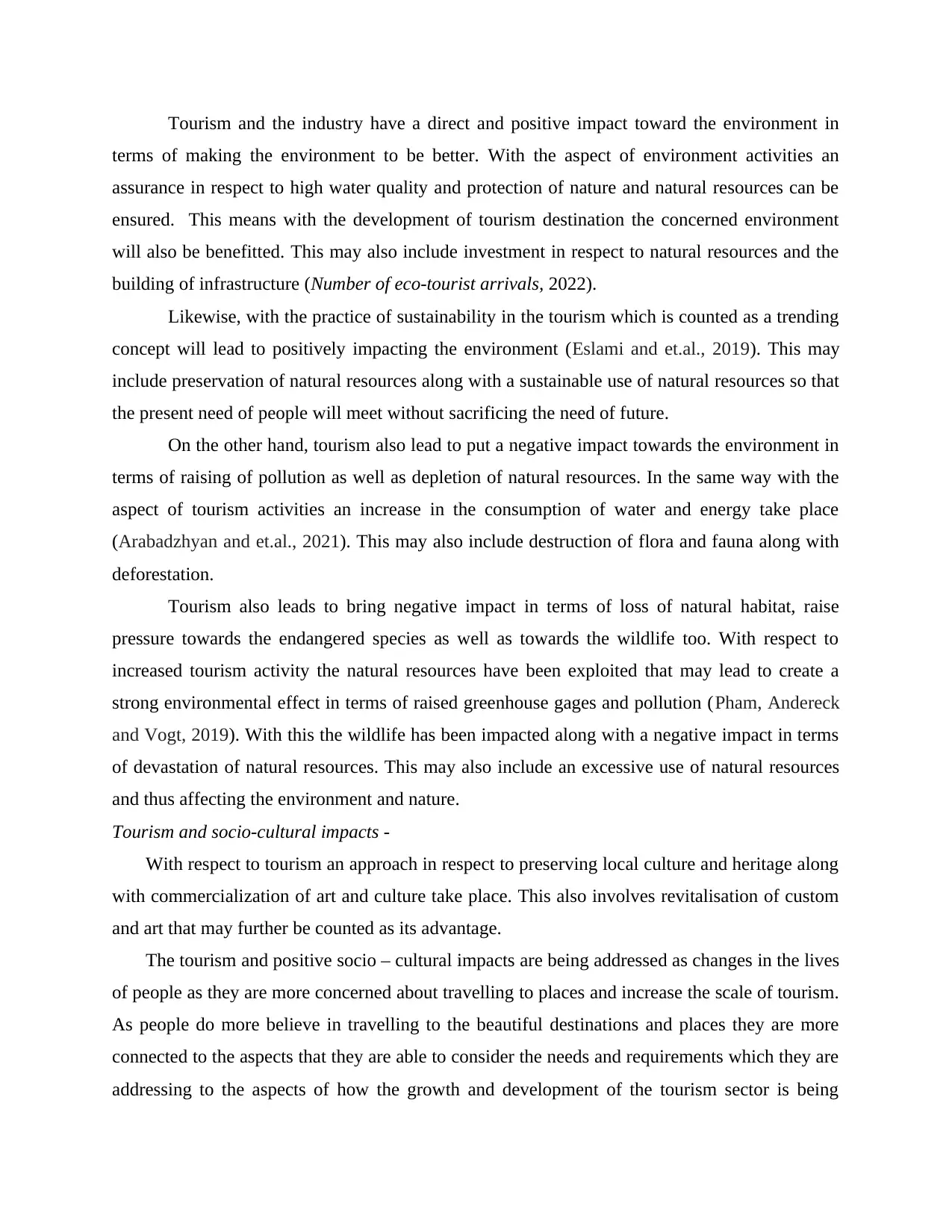
Tourism and the industry have a direct and positive impact toward the environment in
terms of making the environment to be better. With the aspect of environment activities an
assurance in respect to high water quality and protection of nature and natural resources can be
ensured. This means with the development of tourism destination the concerned environment
will also be benefitted. This may also include investment in respect to natural resources and the
building of infrastructure (Number of eco-tourist arrivals, 2022).
Likewise, with the practice of sustainability in the tourism which is counted as a trending
concept will lead to positively impacting the environment (Eslami and et.al., 2019). This may
include preservation of natural resources along with a sustainable use of natural resources so that
the present need of people will meet without sacrificing the need of future.
On the other hand, tourism also lead to put a negative impact towards the environment in
terms of raising of pollution as well as depletion of natural resources. In the same way with the
aspect of tourism activities an increase in the consumption of water and energy take place
(Arabadzhyan and et.al., 2021). This may also include destruction of flora and fauna along with
deforestation.
Tourism also leads to bring negative impact in terms of loss of natural habitat, raise
pressure towards the endangered species as well as towards the wildlife too. With respect to
increased tourism activity the natural resources have been exploited that may lead to create a
strong environmental effect in terms of raised greenhouse gages and pollution (Pham, Andereck
and Vogt, 2019). With this the wildlife has been impacted along with a negative impact in terms
of devastation of natural resources. This may also include an excessive use of natural resources
and thus affecting the environment and nature.
Tourism and socio-cultural impacts -
With respect to tourism an approach in respect to preserving local culture and heritage along
with commercialization of art and culture take place. This also involves revitalisation of custom
and art that may further be counted as its advantage.
The tourism and positive socio – cultural impacts are being addressed as changes in the lives
of people as they are more concerned about travelling to places and increase the scale of tourism.
As people do more believe in travelling to the beautiful destinations and places they are more
connected to the aspects that they are able to consider the needs and requirements which they are
addressing to the aspects of how the growth and development of the tourism sector is being
terms of making the environment to be better. With the aspect of environment activities an
assurance in respect to high water quality and protection of nature and natural resources can be
ensured. This means with the development of tourism destination the concerned environment
will also be benefitted. This may also include investment in respect to natural resources and the
building of infrastructure (Number of eco-tourist arrivals, 2022).
Likewise, with the practice of sustainability in the tourism which is counted as a trending
concept will lead to positively impacting the environment (Eslami and et.al., 2019). This may
include preservation of natural resources along with a sustainable use of natural resources so that
the present need of people will meet without sacrificing the need of future.
On the other hand, tourism also lead to put a negative impact towards the environment in
terms of raising of pollution as well as depletion of natural resources. In the same way with the
aspect of tourism activities an increase in the consumption of water and energy take place
(Arabadzhyan and et.al., 2021). This may also include destruction of flora and fauna along with
deforestation.
Tourism also leads to bring negative impact in terms of loss of natural habitat, raise
pressure towards the endangered species as well as towards the wildlife too. With respect to
increased tourism activity the natural resources have been exploited that may lead to create a
strong environmental effect in terms of raised greenhouse gages and pollution (Pham, Andereck
and Vogt, 2019). With this the wildlife has been impacted along with a negative impact in terms
of devastation of natural resources. This may also include an excessive use of natural resources
and thus affecting the environment and nature.
Tourism and socio-cultural impacts -
With respect to tourism an approach in respect to preserving local culture and heritage along
with commercialization of art and culture take place. This also involves revitalisation of custom
and art that may further be counted as its advantage.
The tourism and positive socio – cultural impacts are being addressed as changes in the lives
of people as they are more concerned about travelling to places and increase the scale of tourism.
As people do more believe in travelling to the beautiful destinations and places they are more
connected to the aspects that they are able to consider the needs and requirements which they are
addressing to the aspects of how the growth and development of the tourism sector is being
Paraphrase This Document
Need a fresh take? Get an instant paraphrase of this document with our AI Paraphraser
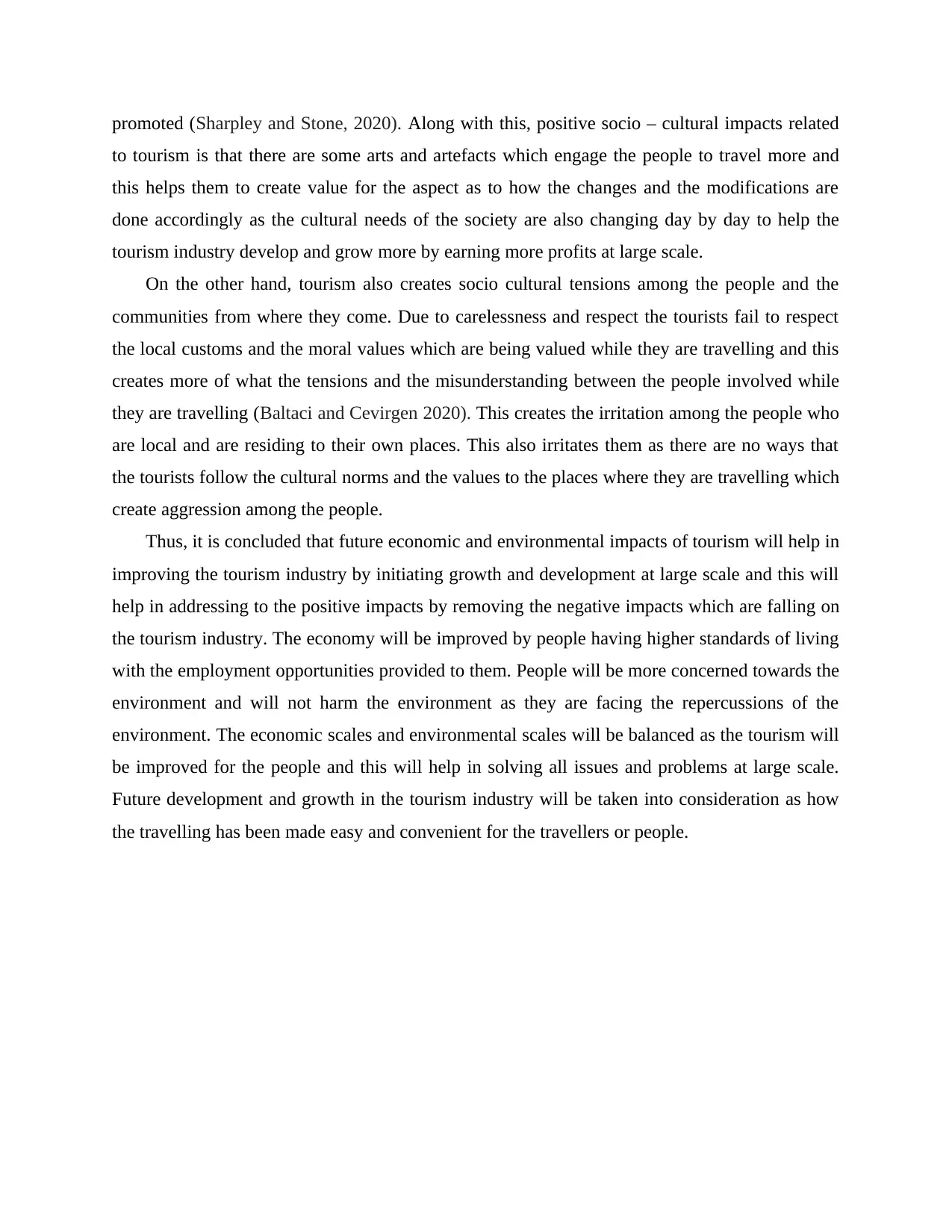
promoted (Sharpley and Stone, 2020). Along with this, positive socio – cultural impacts related
to tourism is that there are some arts and artefacts which engage the people to travel more and
this helps them to create value for the aspect as to how the changes and the modifications are
done accordingly as the cultural needs of the society are also changing day by day to help the
tourism industry develop and grow more by earning more profits at large scale.
On the other hand, tourism also creates socio cultural tensions among the people and the
communities from where they come. Due to carelessness and respect the tourists fail to respect
the local customs and the moral values which are being valued while they are travelling and this
creates more of what the tensions and the misunderstanding between the people involved while
they are travelling (Baltaci and Cevirgen 2020). This creates the irritation among the people who
are local and are residing to their own places. This also irritates them as there are no ways that
the tourists follow the cultural norms and the values to the places where they are travelling which
create aggression among the people.
Thus, it is concluded that future economic and environmental impacts of tourism will help in
improving the tourism industry by initiating growth and development at large scale and this will
help in addressing to the positive impacts by removing the negative impacts which are falling on
the tourism industry. The economy will be improved by people having higher standards of living
with the employment opportunities provided to them. People will be more concerned towards the
environment and will not harm the environment as they are facing the repercussions of the
environment. The economic scales and environmental scales will be balanced as the tourism will
be improved for the people and this will help in solving all issues and problems at large scale.
Future development and growth in the tourism industry will be taken into consideration as how
the travelling has been made easy and convenient for the travellers or people.
to tourism is that there are some arts and artefacts which engage the people to travel more and
this helps them to create value for the aspect as to how the changes and the modifications are
done accordingly as the cultural needs of the society are also changing day by day to help the
tourism industry develop and grow more by earning more profits at large scale.
On the other hand, tourism also creates socio cultural tensions among the people and the
communities from where they come. Due to carelessness and respect the tourists fail to respect
the local customs and the moral values which are being valued while they are travelling and this
creates more of what the tensions and the misunderstanding between the people involved while
they are travelling (Baltaci and Cevirgen 2020). This creates the irritation among the people who
are local and are residing to their own places. This also irritates them as there are no ways that
the tourists follow the cultural norms and the values to the places where they are travelling which
create aggression among the people.
Thus, it is concluded that future economic and environmental impacts of tourism will help in
improving the tourism industry by initiating growth and development at large scale and this will
help in addressing to the positive impacts by removing the negative impacts which are falling on
the tourism industry. The economy will be improved by people having higher standards of living
with the employment opportunities provided to them. People will be more concerned towards the
environment and will not harm the environment as they are facing the repercussions of the
environment. The economic scales and environmental scales will be balanced as the tourism will
be improved for the people and this will help in solving all issues and problems at large scale.
Future development and growth in the tourism industry will be taken into consideration as how
the travelling has been made easy and convenient for the travellers or people.
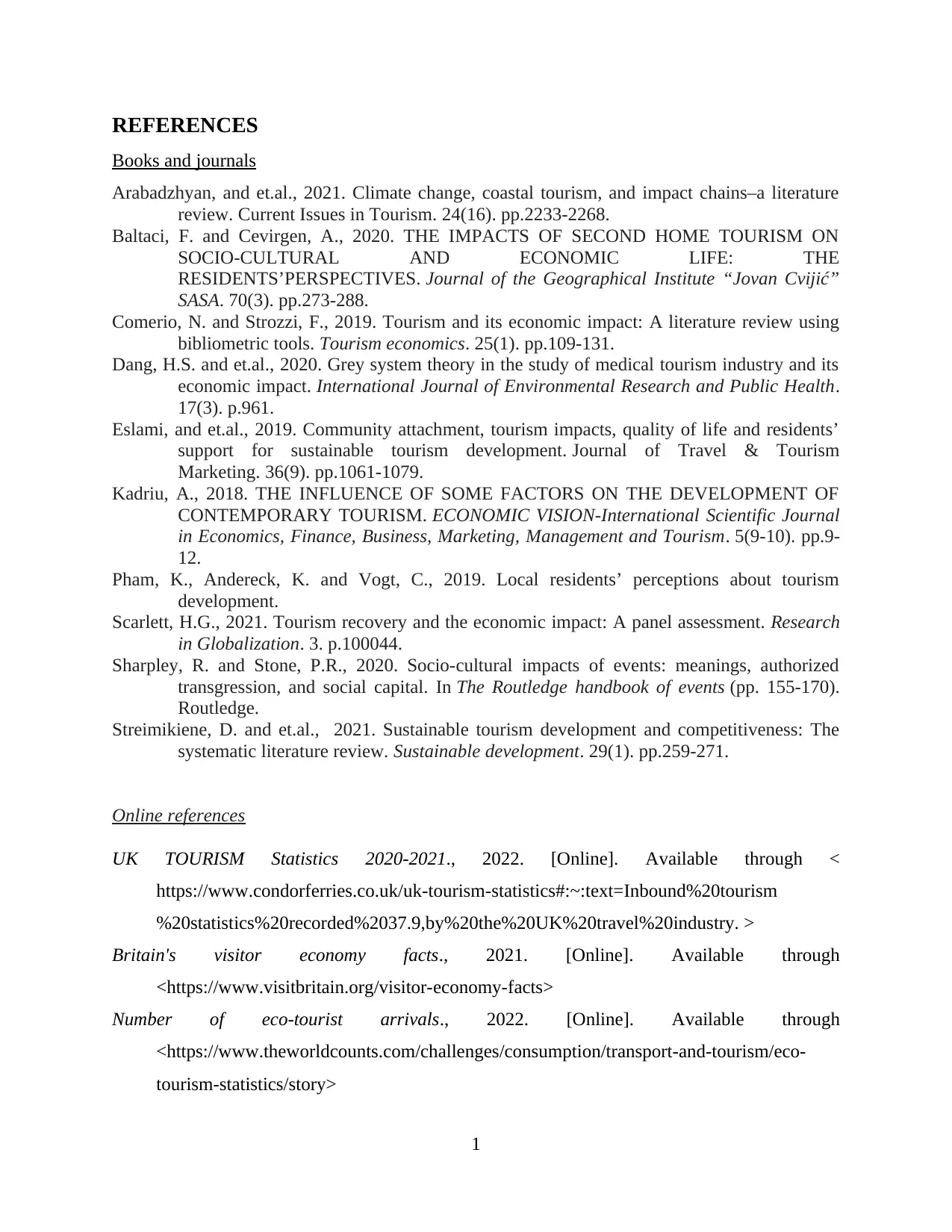
REFERENCES
Books and journals
Arabadzhyan, and et.al., 2021. Climate change, coastal tourism, and impact chains–a literature
review. Current Issues in Tourism. 24(16). pp.2233-2268.
Baltaci, F. and Cevirgen, A., 2020. THE IMPACTS OF SECOND HOME TOURISM ON
SOCIO-CULTURAL AND ECONOMIC LIFE: THE
RESIDENTS’PERSPECTIVES. Journal of the Geographical Institute “Jovan Cvijić”
SASA. 70(3). pp.273-288.
Comerio, N. and Strozzi, F., 2019. Tourism and its economic impact: A literature review using
bibliometric tools. Tourism economics. 25(1). pp.109-131.
Dang, H.S. and et.al., 2020. Grey system theory in the study of medical tourism industry and its
economic impact. International Journal of Environmental Research and Public Health.
17(3). p.961.
Eslami, and et.al., 2019. Community attachment, tourism impacts, quality of life and residents’
support for sustainable tourism development. Journal of Travel & Tourism
Marketing. 36(9). pp.1061-1079.
Kadriu, A., 2018. THE INFLUENCE OF SOME FACTORS ON THE DEVELOPMENT OF
CONTEMPORARY TOURISM. ECONOMIC VISION-International Scientific Journal
in Economics, Finance, Business, Marketing, Management and Tourism. 5(9-10). pp.9-
12.
Pham, K., Andereck, K. and Vogt, C., 2019. Local residents’ perceptions about tourism
development.
Scarlett, H.G., 2021. Tourism recovery and the economic impact: A panel assessment. Research
in Globalization. 3. p.100044.
Sharpley, R. and Stone, P.R., 2020. Socio-cultural impacts of events: meanings, authorized
transgression, and social capital. In The Routledge handbook of events (pp. 155-170).
Routledge.
Streimikiene, D. and et.al., 2021. Sustainable tourism development and competitiveness: The
systematic literature review. Sustainable development. 29(1). pp.259-271.
Online references
UK TOURISM Statistics 2020-2021., 2022. [Online]. Available through <
https://www.condorferries.co.uk/uk-tourism-statistics#:~:text=Inbound%20tourism
%20statistics%20recorded%2037.9,by%20the%20UK%20travel%20industry. >
Britain's visitor economy facts., 2021. [Online]. Available through
<https://www.visitbritain.org/visitor-economy-facts>
Number of eco-tourist arrivals., 2022. [Online]. Available through
<https://www.theworldcounts.com/challenges/consumption/transport-and-tourism/eco-
tourism-statistics/story>
1
Books and journals
Arabadzhyan, and et.al., 2021. Climate change, coastal tourism, and impact chains–a literature
review. Current Issues in Tourism. 24(16). pp.2233-2268.
Baltaci, F. and Cevirgen, A., 2020. THE IMPACTS OF SECOND HOME TOURISM ON
SOCIO-CULTURAL AND ECONOMIC LIFE: THE
RESIDENTS’PERSPECTIVES. Journal of the Geographical Institute “Jovan Cvijić”
SASA. 70(3). pp.273-288.
Comerio, N. and Strozzi, F., 2019. Tourism and its economic impact: A literature review using
bibliometric tools. Tourism economics. 25(1). pp.109-131.
Dang, H.S. and et.al., 2020. Grey system theory in the study of medical tourism industry and its
economic impact. International Journal of Environmental Research and Public Health.
17(3). p.961.
Eslami, and et.al., 2019. Community attachment, tourism impacts, quality of life and residents’
support for sustainable tourism development. Journal of Travel & Tourism
Marketing. 36(9). pp.1061-1079.
Kadriu, A., 2018. THE INFLUENCE OF SOME FACTORS ON THE DEVELOPMENT OF
CONTEMPORARY TOURISM. ECONOMIC VISION-International Scientific Journal
in Economics, Finance, Business, Marketing, Management and Tourism. 5(9-10). pp.9-
12.
Pham, K., Andereck, K. and Vogt, C., 2019. Local residents’ perceptions about tourism
development.
Scarlett, H.G., 2021. Tourism recovery and the economic impact: A panel assessment. Research
in Globalization. 3. p.100044.
Sharpley, R. and Stone, P.R., 2020. Socio-cultural impacts of events: meanings, authorized
transgression, and social capital. In The Routledge handbook of events (pp. 155-170).
Routledge.
Streimikiene, D. and et.al., 2021. Sustainable tourism development and competitiveness: The
systematic literature review. Sustainable development. 29(1). pp.259-271.
Online references
UK TOURISM Statistics 2020-2021., 2022. [Online]. Available through <
https://www.condorferries.co.uk/uk-tourism-statistics#:~:text=Inbound%20tourism
%20statistics%20recorded%2037.9,by%20the%20UK%20travel%20industry. >
Britain's visitor economy facts., 2021. [Online]. Available through
<https://www.visitbritain.org/visitor-economy-facts>
Number of eco-tourist arrivals., 2022. [Online]. Available through
<https://www.theworldcounts.com/challenges/consumption/transport-and-tourism/eco-
tourism-statistics/story>
1
⊘ This is a preview!⊘
Do you want full access?
Subscribe today to unlock all pages.

Trusted by 1+ million students worldwide

2
1 out of 7
Related Documents
Your All-in-One AI-Powered Toolkit for Academic Success.
+13062052269
info@desklib.com
Available 24*7 on WhatsApp / Email
![[object Object]](/_next/static/media/star-bottom.7253800d.svg)
Unlock your academic potential
Copyright © 2020–2026 A2Z Services. All Rights Reserved. Developed and managed by ZUCOL.



